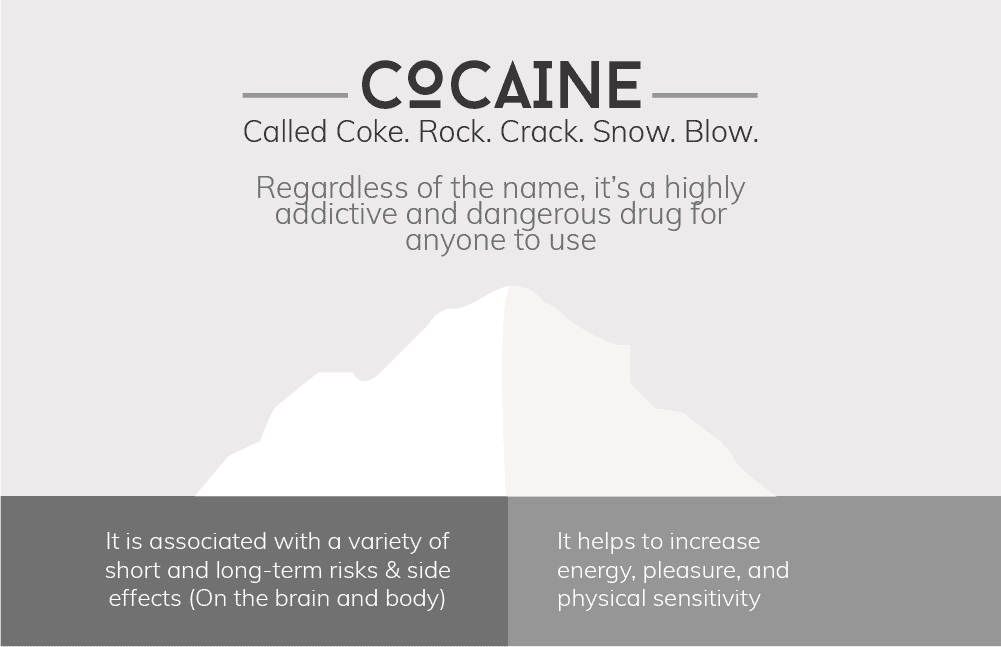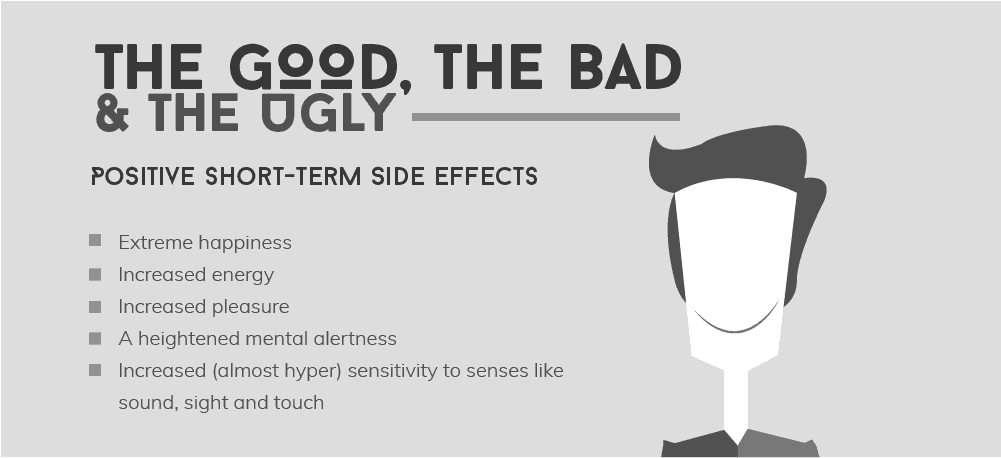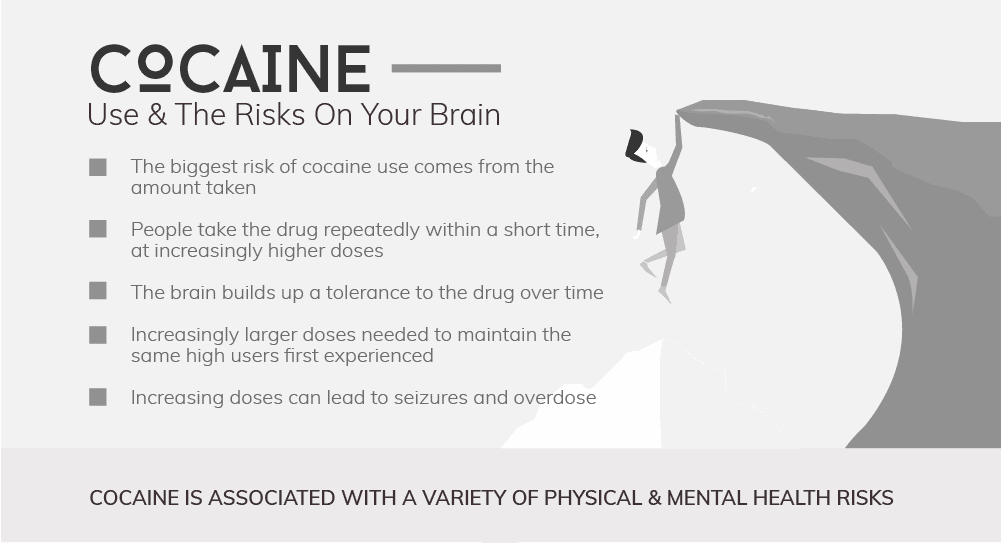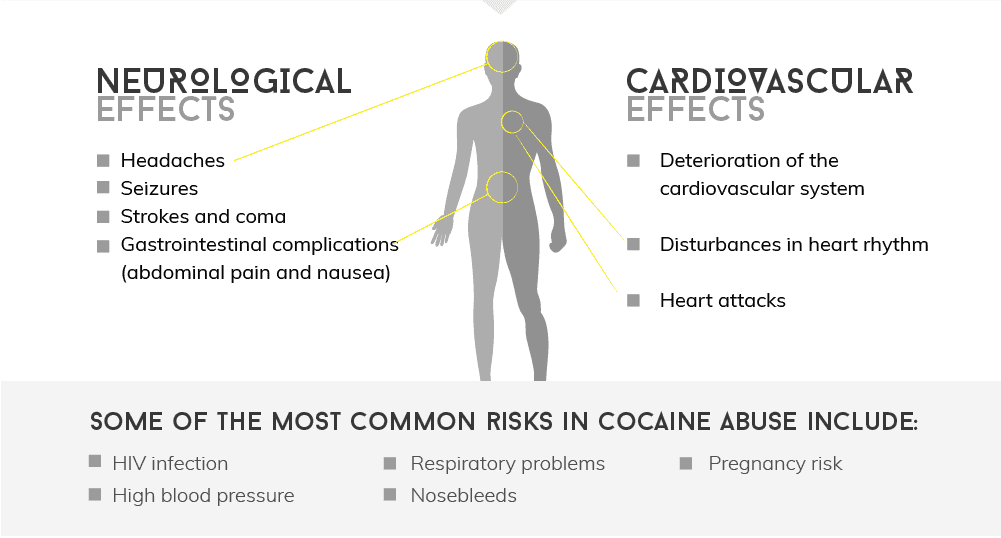Cocaine use has a detrimental effect on your brain. It is associated with many of the same risks and side effects as other addictive drugs. Some people believe that cocaine can be used casually and without any long-term adverse effects. Let us take a moment to dispel that myth: cocaine is dangerous, and the immediate pleasure it produces is certainly not worth the impact it can have on your brain and body. In fact, cocaine affects the chemical reactions of the brain, making the one under its influence experience pleasure and movement in an enhanced way. This is what makes cocaine so attractive to many users, but it is also what makes the drug so powerfully addictive. Because of its addictive nature, cocaine is associated with a variety of risks, short-term side effects, and long-term effects on both the brain and the body. In short, cocaine is a dangerous drug for anyone to use, and can pose long-term health risks for those who become addicted to it. 
“We treat cocaine addiction and accept many health insurance plans. Take a look at our Outpatient Program.”
What is Cocaine?
Cocaine is a stimulant drug. It comes from a plant called coca. The plant is native to South America. People there chewed on the plant for thousands of years. They did this to help fight the effects of living and working at high altitude. But cocaine is very different from coca leaves. People make the drug by refining the leaves. They do this with lots of hazardous chemicals. These chemicals have a serious effect on the environment in places where drug organizations refine the leaves. This tuns the drug into a cocaine paste. Farmers sell the paste to drug cartels. Many farmers don’t have any other way to make a living. That’s one of the reasons it’s so hard to stop cocaine production.
How Does Cocaine Affect the Brain?
Cocaine affects the brain in several ways. In many respects, it acts much like other stimulants. This video explains the science behind blow and your brain. The biggest effect of the drug is to increase dopamine release. Dopamine is the chemical your brain releases to reward you for doing something good. It’s naturally released by activities like eating. But coke causes your brain to release more of the chemical than it normally would. That’s what gives cocaine its euphoric effect. Also, cocaine blocks reuptake. That means the brain doesn’t remove chemicals it would otherwise process out. These chemicals include dopamine, norepinephrine, and serotonin. Together, these chemicals, and others, form the Libmic System. That’s the reward pathways in the brain. The fact that cocaine increases these chemicals creates a powerful association between the drug and happiness. As a result, users want to get more of the drug to get the enjoyable feeling. This makes them seek out more of the drug. But the effects are only temporary. As a result, people constantly seek the drug to get that feeling again. In fact, the feeling is so powerful that some people feel they can’t be happy without the drug. This is the deepest stage of addiction. Instead of using the drug to have fun, people use it to feel normal. This situation requires intensive therapy and rehabilitation for recovery. Professional rehab and treatment are important at this point because of withdrawal. Doctors and therapists can help you manage withdrawal symptoms. That makes it more likely that recovery will be successful. It also decreases the dangers of withdrawal. Medical staff are ready to step in if your body starts having problems from a lack of coke.
The Risks That Cocaine Use Places on Your Brain
The biggest risk in cocaine use is in the amount that is taken. More often than not, people who use cocaine do so in binges – they take the drug repeatedly within a short time, at increasingly higher doses. Because the brain builds up a tolerance to the drug over time, people who use cocaine need larger and larger doses in order to maintain the same high they first experienced. This can come with dangerous consequences. Increasing these doses has a detrimental impact on both your brain and body, often without you even realizing it, which can lead to anything from seizures to overdose. Those are the worst side effects. But there’s lots of other dangers that come with the drug. People are more likely to engage in risky behavior. They’re also more likely to try other drugs. Finally, they’re more likely to harm their bodies. That’s because cocaine affects your brain and your body. It causes your body’s internal clock to speed up, in addition to giving you a high. That means that your heart beats more frequently. That can wear it out or damage it. It can also cause your heart to enlarge. Unlike the situation with the Grinch, an enlarged heart presents a huge risk of death. There are a variety of health and personal risks associated with cocaine use, both on physical and mental health. Some of the most common risks in cocaine abuse include:
- HIV infection
- Hepatitis B and C
- High blood pressure
- Stroke
- Weight loss
- Decreased sleep and interrupted sleep patterns
- Memory loss
- Shortened attention span
- Respiratory problems
- Gastrointestinal diseases
- Nosebleeds
- Altered moods and associated mental health problems
- Pregnancy risk
Clearly, cocaine use is not to be taken lightly. None of these risks are particularly rare, either, especially if cocaine use is sustained or increased over a substantial amount of time. Some of these risks also depend on how you do cocaine. We’ll cover that in greater detail in a later section. The other major risk in cocaine use is poly-drug addiction – that is, using and becoming addicted to other illicit substances besides just cocaine. The National Institute on Drug Abuse describes the risks in cocaine use, as well as the danger in using cocaine alongside other substances, in greater detail: “Severe medical complications can occur with cocaine use. Some of the most frequent are cardiovascular effects, including disturbances in heart rhythm and heart attacks; neurological effects, including headaches, seizures, strokes, and coma; and gastrointestinal complications, including abdominal pain and nausea. Cocaine-related deaths are often a result of cardiac arrest or seizures. Many cocaine users also use alcohol, and this combination can be particularly dangerous. The combination of cocaine and heroin is also very dangerous. Users combine these drugs because the stimulating effects of cocaine are offset by the sedating effects of heroin; however, this can lead to taking a high dose of heroin without initially realizing. Because cocaine’s effects wear off sooner, this can lead to a heroin overdose, in which the user’s respiration dangerously slows down or stops, possibly fatally.”~ National Institute on Drug Abuse Each and every one of these risks, of course, is compounded if cocaine addiction is added to the mix. Because of its highly addictive nature, this is not an unlikely scenario. Consider the heavy and wholly unnecessary risks before using cocaine, even once.
What Side Effects Does Using Cocaine Have on Your Brain?
In addition to the mental and physical health risks that you subject your mind and body to through cocaine use, the drug is also associated with a range of side effects. People take cocaine is to increase energy, pleasure, and even attention in the body. However, this is not always the resulting effect. Even if it is, cocaine use also comes with a host of other, less desirable effects. “Small amounts of cocaine usually make the user feel euphoric, energetic, talkative, mentally alert, and hypersensitive to sight, sound, and touch. The drug can also temporarily decrease the need for food and sleep. Some users find that cocaine helps them perform simple physical and intellectual tasks more quickly, although others experience the opposite effect. Short-term physiological effects of cocaine use include constricted blood vessels; dilated pupils; and increased body temperature, heart rate, and blood pressure. Large amounts of cocaine may intensify the user’s high but can also lead to bizarre, erratic, and violent behavior. Some cocaine users report feelings of restlessness, irritability, anxiety, panic, and paranoia. Users may also experience tremors, vertigo, and muscle twitches.”
- Extreme happiness
- Increased energy
- Increased pleasure
- A heightened mental alertness
- Increased (almost hyper) sensitivity to senses like sound, sight and touch
- Irritability
- Mood swings and depressed feelings
- Paranoia
- Extreme distrust of those around you
- Anxiety
- Irritability
These are some of the major side effects caused by cocaine use, particularly during the high caused by the drug. However, the drug is also associated with other, long-term side effects that are well worth considering. This includes everything from deterioration of the cardiovascular system to the permanent loss of major cognitive functions. “Generally, studies suggest that a wide range of cognitive functions are impaired with long-term cocaine use – such as sustaining attention, impulse inhibition, memory, making decisions involving rewards or punishments, and performing motor tasks.” ~ National Institute on Drug Abuse
How You Do Cocaine Matters
More specifically, some side effects vary depending on how the drug is taken: by snorting, by smoking, or by injection. Those who snort cocaine for a long period of time often experience a decreased sense of smell, extensive nosebleeds or a running nose, and even issues with swallowing. Smoking crack cocaine is associated with damage to the lungs, which can either cause or worsen asthma in some. Shooting (or injecting cocaine) puts users at risk of either HIV or hepatitis, as mentioned above. No matter how the drug is taken, or which street name it takes on, there is no doubt that the risks and side effects of cocaine use are not worth the momentary high in your brain.
“Get the help you need today. We offer outpatient assistance, so you can maintain your work, family, and life commitments while getting the help you deserve!”
The Difference Between Smoking, Shooting, and Injecting Cocaine
There are other important differences for different ways to use cocaine. Smoking the drug causes it to get to your brain faster. That makes the high much more intense. It can also be more addictive. When you smoke cocaine, it gets to your brain in about 8 seconds. That’s compared to the 10 minutes it takes to get to your brain when you snort it. The drug acts the same once it’s affecting your brain. It causes your brain to release the same chemicals and respond in the same way. But it gets there all at once when you smoke the drug. That can increase the risk of overdose. This adds another risk. Users become accustomed to the intensity they get from smoking or shooting the drug. That means they’re more likely to overdose when snorting. They chase the high they’re used to. But the delay makes people want to do more of the drug. That means they can take more than they realize. This is especially dangerous because the quality of the drug isn’t regulated. Dealers cut the drug by different amounts. That means users never really know how much blow they’re doing. As a result, they can accidentally overdose if they get coke that’s more pure than they’re used to.
Using Blow and Other Drugs at the Same Time
Many addicts are polydrug abusers. That means they abuse more than one drug at a time. This is especially dangerous. That’s true for any combination of drugs. But, cocaine is a particularly deadly mixer. That’s because of several factors. First, cocaine is a powerful stimulant. That means taking it with other stimulants increases the risk of an overdose. But, taking coke with depressants is also dangerous. This is a practice known as speed balling. It involves taking a stimulant and a downer at the same time. This sends the brain and body opposite signals. As a result, your body is confused. It doesn’t know whether to speed up or slow down.
Can You Recover from Cocaine Addiction?
Any recovery is a tough road. But it is possible to recover from cocaine addiction. The brain is an impressive organ. It adapts to its environment. That’s why addiction happens. The brain enjoys cocaine. That makes it want more. When it gets more, it starts to think that cocaine is normal. It rewires itself based on this. But that doesn’t mean your brain is permanently changed. Neuroplasticity means it can change again. Your neurons get connected in harmful ways when you are addicted to blow. You can change the way these neurons connect when you get clean. This isn’t an easy thing to do. It requires a lot of hard work. This work comes in the form of therapy and rehabilitation. Sometimes doctors can give you medication that can help. The most important thing is to stay away from cocaine. This gives your brain the time it needs to adjust to life without blow. Remember, your brain adapts to its situation. Once it realizes that it won’t be getting any more coke it starts to revert to its previous state. That doesn’t mean that you won’t be changed. No one comes out of an addiction exactly like they were before. The experience of addiction shapes the way the understand the world. It also changes how they understand themselves. That’s why professional rehabilitation is so important. It gives people the time and tools they need to adjust to a life without blow. The resources at addiction recovery centers help you retrain your brain in the best way possible. One of the most important resources for addiction recovery is access to therapy. This kind of access lets people talk through their thoughts. A therapist helps them understand their desire to use. The therapist also gives them tips and tricks to avoid relapse. The risks and side effects discussed here have hopefully given you a better understanding of cocaine and your brain. If you already use cocaine and think you might need help in getting the substance abuse treatment that you need, do not hesitate to reach out today. Cocaine abuse and addiction can be detrimental to your mental and physical health. But that does not mean that the effects of the dangerous drug cannot be overcome. If you have more questions, or a story to share, feel free to leave a comment below.
What Did you Think About This Blog?
Give it a Rating!





